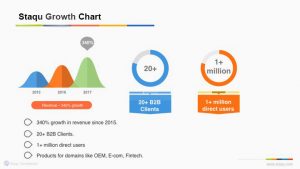Have you ever had hard time searching for images of that random t-shirt, or sarees you come across on streets or e-commerce site or say in movie? If your answer is in affirmation then you might like to say thanks, to applications of AI in image domain amalgamation with textual analysis created by startup called Staqu, which has gone beyond the limitation of language and developed an innovative image-to-image matching system, simplifying image search, automated and real-time recommendation for e-commerce companies, to resolve the real world problem.
“The e-commerce sector heavily depended on images; we conceived an invigorating opportunity in optimising the image based AI in the domain of fashion e-commerce. This is going to save a lot of time,” says Atul Rai, CEO and co-founder of Staqu. “API is thing which most of companies are now doing. I have not found any company doing search, meta tag, trend analysis and recommendation,” adds Rai talking about staqu’s USP.
Staqu was founded in 2015, by Atul Rai along with Anurag Saini, Chaitan Rexwal and Pankaj Sharma. The startup boasts of having served 8 lakh users till now. Staqu claims to have more than two lakh images of fashion apparel in its database, and has served over 2,000 image queries from customers since its launch.
“We have seen a very positive response with almost 85% of users returning to our platform to discover and buy products. This not only strengthens our premise of AI making huge strides towards easing the pain-point of users, but also helps convey the message that users have technically come of age to accommodate such features in their daily lives,” Rai explains.
He also does not want his enterprise to be limited to single vertical.
“At present, we are solving the problems of fashion e-commerce, soon we are planning to expand to other domains as well. We don’t want to miss opportunities in other domains. Apart from e-commerce, one can apply this solution to a variety of domains such as medical imaging, image augmentation, financial analysis and authentication, user behavioural analytics, and so on,” Rai says.
The company works on revenue-share model. They charge for services and API licensing.
Products and Marketing strategy
In 2016, Staqu barged in to B2C market with the launch a fashion app, Fashin to act as the personal stylist and guide for fashion enthusiasts. It is built with AI capabilities to extract fashion from a YouTube video. It also allows fashion enthusiasts to search for their favourite clothes simply by uploading images, instead of having to describe the elaborate patterns and fabrics and also compare the prices from different e-commerce sites. Fashin today has over 1000 YouTube videos listed for your use as a guide to personal styling.
Recently, it partnered with Karbonn mobiles to launch a series of smartphones called FashionEye. FashionEye helps users search and discover fashion by taking the image of a product, and using it to search across a multitude of products in a catalogue.
“AI is all about data- mainly extracting information from data. We want to be technology specifics. These days, everyone likes to watch videos on social sites or youtube. Multi-media is another domain, we are utilizing our technology. We would like to expand in terms of size and products,” says Rai. Staqu has 20-member team. It also provides its services in Face recognition, gesture recognition, emotion recognition, and pose estimation to marketers.
Investment, Growth and Revenue
In 2015, for being standout startup, Staqu was picked amongst the top four start-ups by IBM’s Global Entrepreneur Programme. It also raised funds from the Indian Angel Network in an investment round led by Ajay Gupta, Bikky Khosla and Neeraj Singal. The investors saw value in the products developed by Staqu, which can be leveraged to increase the sales of fashion e-commerce portals, provide a flawless user experience and help OEMs include an additional revenue stream.
“We plan to achieve break-even by June 2017,” says Staqu co-founder.
Staqu is currently working with 20 companies as its clients. Among the many clients, it has worked with YEPME, Paytm and ROPOSO. The firm has seen 340% growth in revenue since 2015.
When asked about the future of AI, Rai says, “Every large firm in the world is trying to bring AI into their products. Amazon and Google did this, back in 2010, through its recommendation engine which helped it saw 29% increase in sales. Indian ecommerce companies are slowly adopting AI in various aspects of their businesses to reduce costs and drive sales.”
“Artificial Intelligence can reduce these costs just to a fraction through automation. This automation is what will drive the future, and it is high time that every ecommerce company in India opens up to it,” he concludes.














